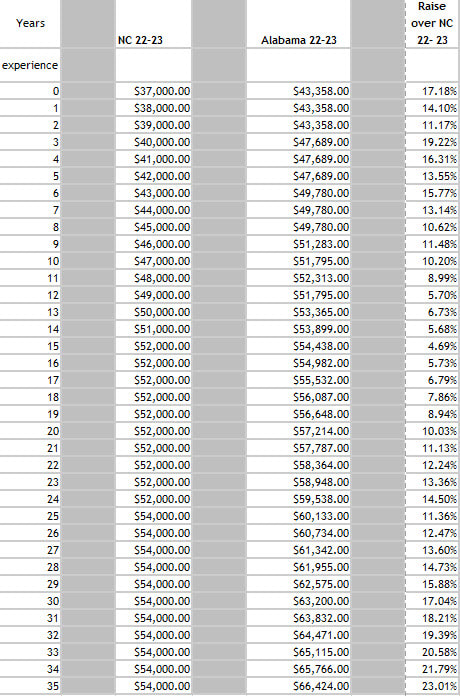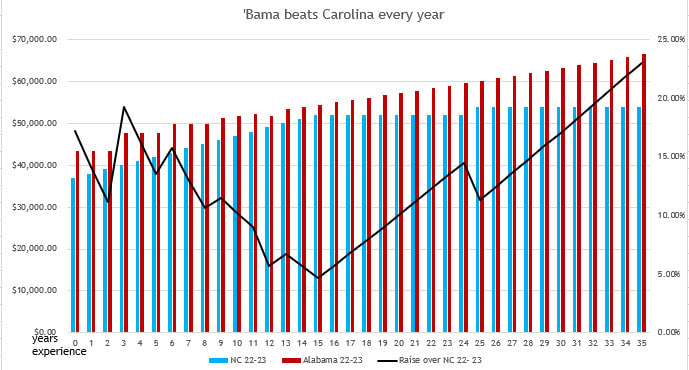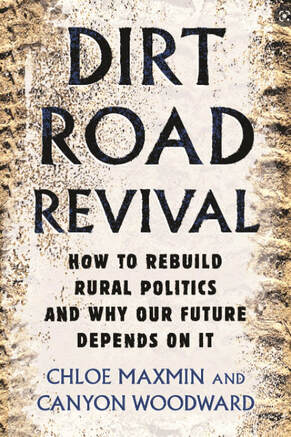John deVille's musings on history, politics, philosophy, and Appalachia.
Episode 5 Deja vu: Another stillborn education reform for the people of North Carolina — a conversation with public education advocate and teacher Kim Mackey.
|
As Yogi Berra said, “it’s deja vu all over again.”
And the deja vu is yet another public education reform effort. Yet another proposal which believes the solution to what ails North Carolina public education is lack of tasty carrots for teachers, and the assumption we have too often been spared the beatings from sticks. So, If you’ll give me a few minutes, I want to walk you through as to how we got to the present moment, and then what follows is a conversation with my friend and fellow NC public school teacher, Kim Mackey. Kim can fill you in on the details and shortcomings of the current proposal. This October I will have spent 27 years teaching in NC public school classrooms. When I came to work in Macon County Schools in the fall of 1995, the General Assembly had just passed the “ABCs. I was there for it. There were just a handful of us fighting it, we weren’t particularly savvy about the potency of the forces arrayed against public school teachers and their students. I blogged it at http://www.oocities.org/nccds/ — North Carolina Citizens for Democratic Schools. There’s a link in the show notes, but the long and short of the ABCs is that it was a scheme designed to make teachers more “accountable” (the “A” part), while ostensibly focusing on Basics (the “B”), while promising local Control (the “C”). The accountability portion of the model was supposed to be maintained by high-stakes, multiple-choice standardized tests. The stick in the plan was the threat to retain a child if they didn’t hit a certain cut score on the test. The carrots in the plan were bonuses for the teachers of a particular school if they collectively raised test scores. None of it ever made any sense. We would teach the same content to the same sorts of students from year to year, and in one year, receive praise and a small bonus only to receive criticism and no bonus the next year. The cut scores never made any sense. Here’s why — stick with me for just a minute — you can get this if you don’t already know it. There are basically two ways to decide what a passing score on a test will be. One way, the way we’re most familiar with, is that we decide ahead of time that anyone making say above a “70” or a “60” passes. This is the way most teachers operate with most of their assessments, especially as we get to the 5th grade and beyond. It’s the way the driver’s license test works. These kinds of tests with these kinds of cut scores are what are known as criterion referenced tests. In other words, “each person’s performance is compared directly to the standard, without considering how other students perform on the test.” But that’s not how NC standardized tests worked starting in 1996 up through the present. NC Department of Public Instruction uses norm referenced tests which “compare a person’s knowledge or skills to the knowledge or skills of the norm group.” What’s that mean? That means on a norm-referenced test there are GUARANTEED WINNERS and GUARANTEED LOSERS. Back at the DMV, with your driver’s license test, theoretically everyone could pass, or, theoretically, everyone could fail. But on a norm referenced test a certain percentage will pass and a certain percentage will lose NO MATTER HOW WELL OR HOW POORLY the collection of test takers do. Back in the late 90s, and early 2000s, this didn’t always work out so well for the Dept of Public Instruction because they set the cut scores ahead of time based on what they predicted the curves would be, where they thought the range of results would fall. And they frequently blew it. We had moments where almost every single student “passed” a test. We had moments where almost every single student “failed” a test. DPI, the General Assembly, the State Board of Education, and the ABCs rapidly lost credibility. And that was no small matter. Because student promotion rested on those results. Because teacher bonuses rested upon those results. There was an outside audit. There were hamfisted fixes. And in the end none of it really mattered because in the spring of 2009, the General Assembly decided that it could no longer afford the paltry, infrequent, capricious bonuses and they knew the whole scheme was intellectually bankrupt, and then none of it made a tinker’s damn in the quality of NC public education and they offered paltry raises instead. The ABCs died an ignominious death on the field of educational reform because that’s what happens to almost all educational reform efforts. Why are almost all educational reforms stillborn? Why is the current licensure and pay scheme stillborn? They are created in an educational lab by technocratic “experts”, people who are not currently in the classroom, if they ever were. Every reform effort is a house of cards built on faulty assumptions about children, about the reasons for the current perceived deficits in their instruction. Every reform is more technocratic than the last . Every reform is more bureaucratic than the last. Every reform is more cumbersome than the last. Every reform is more oblivious to unintended consequences than the last. Every reform shuts out the teacher voice except for those who have been specifically recruited to be boosters, cheerleaders, spokesmodels, and propagandists. Every reform created is cloaked in the marketing drivel that it is NEW!, that nothing like it has come before. But to paraphrase the great Yogi Berra, “it’s ALWAYS deja vu all over again” when it comes to education reform. Especially in NC. In 2013, long after the ABCs had collapsed, the General Assembly proposed yet another public education reform — get teachers to give up their due process rights in exchange for a few hundred dollars a year more. And as bad as that sounds, it was worse — because school boards were asked to identify the top 25% of their classroom teachers — only the “top 25%” would be allowed to trade due process for a few bucks. In a historical moment of unity, NC teachers, NC county school boards, and the attorneys advising those school boards (who could see a tsunami of lawsuits headed towards their clients), all got together and said a collective, “HELL NO!” to that nutty, cruel, unworkable, legally perilous scheme which would have borne no positive fruit in the NC classrooms. The key to remember here is that these nutty schemes CAN BE DEFEATED if we come together, call out the crazy, form alliances across the spectrum, across the state, and make the proposal so toxic no lawmaker, no policy maker will want to be associated with it. Why this long preamble? Why the history on the ABCs reform? Because the current licensure and pay plan currently being worked on by the elves on the PEPSC (Professional Educator Preparation and Standards Commission) subcommittees at for the NC State Board of Education are recreating much of the ABCs plan, 25 years later. What’s the same and what’s even worse? What’s the same is at least partial reliance on standardized tests. What’s different? Beyond the test results which are supposedly going to be one way to get the new higher pay are either student questionnaires where students evaluate teachers AND/OR administrator/peer review or some sort of cryptic combination of two or three of these. So, now to the big picture. The overlap, the deja vu. From 1996 to the present to the proposed future, NC public education has relied to varying extents on type of standardized tests which are norm referenced where, like the NC Lottery, only a certain percentage of teachers and students can win. Those tests determined a portion of our pay from 1996 to about 2008, was proposed to partially determine pay in 2013, and is once again a key component for pay. But this time it’s different, it’s way worse. This time the pay difference coming from test score data is in the thousands of dollars, over ten thousand dollars a year in some instances. And this time, the current version of the licensure and pay model seems to strongly indicate that those guaranteed winner/loser test scores could be used to revoke a teacher’s license and utilize one of the newly proposed “off ramps” — the PEPSC committees’ word for termination, not mine. And it’s not just the norm-referenced tests, the EVASS scores that are going to severely limit the percentage of NC teachers who can achieve the higher licensure levels and corresponding increased pay, What else is different this time? We’re wiser, we’re better organized, we know their game. We really can win this time, like we won in 2013. We have to educate our fellow educators, our parents, our business leaders, and the great collection of North Carolina citizens who enjoyed the best public education system in the southeast for decades who are clearly disgusted that we are currently dwelling in the cellar. We can do what Mississippi did, who said a big “HELL NO!” to this insanity and are paying their teachers far better than NC will in the 2022-23 school year. We can do what Alabama did when the same Human Capital Education Roundtable made the pitch they did to Mississippi (and who are now pitching North Carolina on their Amway snake oil), who said a big “HELL NO!” and will pay their teachers even more than Mississippi in the upcoming school year. The NC teacher pipeline is in historic disrepair. Vacancies went up 60% just this past year. Many students will start, and likely finish the year with a sub or otherwise unqualified teacher in their classrooms. Rather than patching the pipeline with sorely needed teacher pay and other essential resources, this scheme will blow more holes in this crucial pipeline. What should you be doing if this reporting disturbs you? First, you can contact the members of the PEPSC subcommittees with the link at the bottom of the show notes. You can sign the petition which I have linked in the show notes. Follow Kim Mackey. Please follow Justin Parmenter who just isn’t a great teacher, he is by far the one of the best investigative journalists covering the NC public education beat. Utilizing Freedom of Information Act requests, Justin has uncovered emails which reveal the awareness of several PEPSC subcommittee members that the scheme has serious flaws and how senior committee leaders have routinely dismissed their concerns. Originally the PEPSC spokespeople vigorously denied that this new scheme was a merit pay model. Because of Justin and Kim’s reporting and illumination, the spokespeople now sheepishly admit that the new scheme is indeed a merit pay plan. You should be following public education journalist, Kris Nordstrom, on Twitter. You should be following Stu Egan at Caffeinated Rage who has a voluminous knowledge and prodigious output of the ongoing shenanigans in the arena of North Carolina public education. Mountain Philosopher podcast will be covering this scheme as well. You should be having conversations with your school board members, principals, superintendents, and central office members. You should be talking with local media. You can join NCAE which is going all in on a campaign to shine a light on this nefarious scheme. NCAE has embarked on the most effective and vital effort to inform the general public in all my 27 years of membership in that professional association. You can contact your members of the General Assembly who are slated to be handed this scheme in the session which starts in January of 2023. I hope my conversation in this podcast episode with Kim Mackey fills in the gaps for you and I hope you will be moved to action. And as Yogi Berra said when the Mets were down in the bottom of the ninth inning to rally his team to a victory, “it ain’t over ‘til it’s over.” |
Sign the petition
http://link.ncae.org/ExperienceMatters4NC Information about the licensure/pay plan as well as link to email PEPSC subcommittee members https://www.ncae.org/licensure#about My old blog from 2001 http://www.oocities.org/nccds/ An explanation of the old ABCs https://lesn.appstate.edu/olsontoo/ABC%20web%20folder/NC%20ABC%20tests.htm Justin Parmenter’s blog https://notesfromthechalkboard.com/ Stu Egan’s blog https://caffeinatedrage.com/ Kim Mackey’s blog https://educatedpolicy.com/ Kris Nordstrom on Twitter https://mobile.twitter.com/KrisNordstrom Justin Parmenter on Twitter https://mobile.twitter.com/JustinParmenter/ Join NCAE https://www.ncae.org/join |
Episode 4: Dirt Road Revival — A Conversation with authors Senator Chloe Maxmin and Campaign Manager Canyon Woodward
We all know that part of the reason for the extreme red/blue, Republican/Democrat, rural/suburban/urban divide when it comes to actual electoral results lies in the arena of values, sensibilities, traditions. Population densities, geological topographies, and their attendant histories shape our thinking more than we usually, probably always, know.
Beyond all of that is an ugly truth which the Democratic Party and progressives are loath to acknowledge.
And that truth is they have almost entirely abandoned the rural voter. And when progressives speak of the rural it is speech all too often saturated with scornful, mocking disdain and derision. All too often when it comes to the rural, the Democratic Party is hellbent on the self-fulfilling prophecy that rural voters lie beyond their reach. They tell themselves that the cultural divide is too great. The utilitarian calculus is that scarce resources of canvassing time and media dollars would be better spent rallying “the base” or perhaps to just abandon the electoral field altogether.
And that has left rural voters listening to only one megaphone and frequently leaving them with only one choice in the polling booth. To maintain this situation, this dynamic is to engage what pilots refer to as “augering in” — a death spiral which intensifies as the aircraft speeds towards an inevitable crash.
We can see that in my home county of Macon, NC. Democrats have only two races to vote on in the upcoming May 17th primary. We have a choice in the NC Senate which has already been decided and we have a choice of who will face the likely winner of the GOP primary for the 11th Congressional District, the incumbent Madison Cawthorn. So one meaningful race for Democrats in the May 17 primary.
No Democratic candidates for sheriff for Macon County.
No Democratic candidate in one of the county commissioner races.
And only one Democrat in a race that would allow the party to field two candidates in the general election.
Maine State Senator Chloe Maxmin and her campaign manager of two successful races for the Maine State Legislature, Canyon Woodward, did not just seek to reverse the augering in — they pulled the progressive plane out of the spiral. Twice. They reversed the prevailing physics. Twice. They shredded the conventional wisdom of the Democratic Party playbook twice.
Senator Maxmin flipped a longstanding-Republican Maine State House seat in 2018 with the co-leadership of Canyon Woodward. They did this in their mid twenties. And then they successfully conjured lightning a second time, unseating the Maine State Senate minority leader in 2020.
And now they have written a book about their journey, their strategies, and their tactics.
This is a book about two rural relative youngsters connecting to their roots and their people. This is a book about deep listening. This is a book about empathy. This is a book about creativity and letting voters lead. Perhaps most of all, it’s a book about hard work.
I shrank back from the second half of the book where Chloe and Canyon discuss specific tactics. Good God, the work. The 20-hour-a-day work. The long conversations. The thousands of handwritten thank you notes. And so much more. You’ll need a nap before and after this section.
Chloe and Canyon have so much to teach us because they have walked the walk.
This just isn’t any interview for me.
Canyon was the second Woodward son to grace my classroom. I had Canyon as a philosophy and AP US History student. We worked together with our mutual friend Julia Buckner on the Jane Hipps campaign. My heart is so full when I witness all of his success which doesn’t fit neatly into the cells of a spreadsheet but rather into the chambers of the human heart.
I am so grateful to Canyon for our friendship, for the bonfires, for his prodding me to do the Mountain Philosopher podcast, for his kind words in Dirt Road Revival.
And I am so grateful to him for introducing me to Chloe Maxmin, who is every bit the dynamo and kind soul Canyon is. I am grateful to Chloe for allowing me to weigh in on her campaigns, to scan an article she and Canyon wrote for The Nation after their first victory, to read the early chapters of Dirt Road Revival, for her kind acknowledgements, and for squeezing in this fledgling podcast when the current media demands on her time are substantial.
Those who create human geography frames have Appalachia running from Mississippi to New York, and into much of eastern Ohio. The Appalachian Trail itself starts just 110 miles south of Franklin and terminates in Mount Katahdin. Chloe and Canyon have started the revival near Katahdin. May that revival flow down the Appalachian Mountains and into every part of rural America, down every dirt road, where we can encounter each other, listen to each other with respect and love, and utilize the political process not to cynically polarize, but to work together for the common good.
YouTube Version
https://youtu.be/jgousGwqsE0
Buy the book
https://www.penguinrandomhouse.com/books/691154/dirt-road-revival-by-chloe-maxmin-and-canyon-woodward/
Chloe & Canyon’s next venture
Dirtroadorganizing.org
Chloe & Canyon’s NYTimes Op-Ed
https://www.nytimes.com/2022/05/02/opinion/democrats-rural-america.html
We all know that part of the reason for the extreme red/blue, Republican/Democrat, rural/suburban/urban divide when it comes to actual electoral results lies in the arena of values, sensibilities, traditions. Population densities, geological topographies, and their attendant histories shape our thinking more than we usually, probably always, know.
Beyond all of that is an ugly truth which the Democratic Party and progressives are loath to acknowledge.
And that truth is they have almost entirely abandoned the rural voter. And when progressives speak of the rural it is speech all too often saturated with scornful, mocking disdain and derision. All too often when it comes to the rural, the Democratic Party is hellbent on the self-fulfilling prophecy that rural voters lie beyond their reach. They tell themselves that the cultural divide is too great. The utilitarian calculus is that scarce resources of canvassing time and media dollars would be better spent rallying “the base” or perhaps to just abandon the electoral field altogether.
And that has left rural voters listening to only one megaphone and frequently leaving them with only one choice in the polling booth. To maintain this situation, this dynamic is to engage what pilots refer to as “augering in” — a death spiral which intensifies as the aircraft speeds towards an inevitable crash.
We can see that in my home county of Macon, NC. Democrats have only two races to vote on in the upcoming May 17th primary. We have a choice in the NC Senate which has already been decided and we have a choice of who will face the likely winner of the GOP primary for the 11th Congressional District, the incumbent Madison Cawthorn. So one meaningful race for Democrats in the May 17 primary.
No Democratic candidates for sheriff for Macon County.
No Democratic candidate in one of the county commissioner races.
And only one Democrat in a race that would allow the party to field two candidates in the general election.
Maine State Senator Chloe Maxmin and her campaign manager of two successful races for the Maine State Legislature, Canyon Woodward, did not just seek to reverse the augering in — they pulled the progressive plane out of the spiral. Twice. They reversed the prevailing physics. Twice. They shredded the conventional wisdom of the Democratic Party playbook twice.
Senator Maxmin flipped a longstanding-Republican Maine State House seat in 2018 with the co-leadership of Canyon Woodward. They did this in their mid twenties. And then they successfully conjured lightning a second time, unseating the Maine State Senate minority leader in 2020.
And now they have written a book about their journey, their strategies, and their tactics.
This is a book about two rural relative youngsters connecting to their roots and their people. This is a book about deep listening. This is a book about empathy. This is a book about creativity and letting voters lead. Perhaps most of all, it’s a book about hard work.
I shrank back from the second half of the book where Chloe and Canyon discuss specific tactics. Good God, the work. The 20-hour-a-day work. The long conversations. The thousands of handwritten thank you notes. And so much more. You’ll need a nap before and after this section.
Chloe and Canyon have so much to teach us because they have walked the walk.
This just isn’t any interview for me.
Canyon was the second Woodward son to grace my classroom. I had Canyon as a philosophy and AP US History student. We worked together with our mutual friend Julia Buckner on the Jane Hipps campaign. My heart is so full when I witness all of his success which doesn’t fit neatly into the cells of a spreadsheet but rather into the chambers of the human heart.
I am so grateful to Canyon for our friendship, for the bonfires, for his prodding me to do the Mountain Philosopher podcast, for his kind words in Dirt Road Revival.
And I am so grateful to him for introducing me to Chloe Maxmin, who is every bit the dynamo and kind soul Canyon is. I am grateful to Chloe for allowing me to weigh in on her campaigns, to scan an article she and Canyon wrote for The Nation after their first victory, to read the early chapters of Dirt Road Revival, for her kind acknowledgements, and for squeezing in this fledgling podcast when the current media demands on her time are substantial.
Those who create human geography frames have Appalachia running from Mississippi to New York, and into much of eastern Ohio. The Appalachian Trail itself starts just 110 miles south of Franklin and terminates in Mount Katahdin. Chloe and Canyon have started the revival near Katahdin. May that revival flow down the Appalachian Mountains and into every part of rural America, down every dirt road, where we can encounter each other, listen to each other with respect and love, and utilize the political process not to cynically polarize, but to work together for the common good.
YouTube Version
https://youtu.be/jgousGwqsE0
Buy the book
https://www.penguinrandomhouse.com/books/691154/dirt-road-revival-by-chloe-maxmin-and-canyon-woodward/
Chloe & Canyon’s next venture
Dirtroadorganizing.org
Chloe & Canyon’s NYTimes Op-Ed
https://www.nytimes.com/2022/05/02/opinion/democrats-rural-america.html
| episode_3_mendez_wilson.mp3 | |
| File Size: | 47320 kb |
| File Type: | mp3 |
Today I'm interviewing two 2016 Franklin High School graduates who are also graduating from Western Carolina University’s Masters in Public Administration program in a few weeks. Erick Mendez and Matt Wilson came back onto my radar after writing columns on racism for WNC publications, and I’ve included those columns in the show notes. The penetrating incisiveness of their writing, their clarity, their call to action pierced the fog of the op ed page. We discussed their time in Macon County Schools as it relates to race. We talked about their plans to possibly work in the Triad area in municipal and county government and what has shaped their respective philosophies. And then we broached the hot topic of the moment, critical race theory — if you want to jump ahead, that’s around the 27 minute marker. When I spoke to Erick and Matt, I felt good about the future. They are so sharp, reflective, caring, humble, and compassionate. The mountains can be harsh, the mountains can be loving, but in either case wisdom is always imparted if we listen. I hope you enjoy the show.
Erick and Matt's columns on confronting racism
https://www.nber.org/digest/sep03/emp...
https://www.epi.org/publication/the-c...
https://www.zinnedproject.org/materia...
Mapping Inequality Redlining in New Deal America
Erick and Matt's columns on confronting racism
https://www.nber.org/digest/sep03/emp...
https://www.epi.org/publication/the-c...
https://www.zinnedproject.org/materia...
Mapping Inequality Redlining in New Deal America
Episode 2: Making the Revolution Between Starshine and Clay
Episode 2: “Making the Revolution Between Starshine and Clay”, with special guest George Friday
Lucille Clifton’s Won’t You Celebrate With Me?
Langston Hughes’ Let America Be America Again
Nikki Giovanni’s Revolutionary Dreams
Nikole Hannah-Jones essay from the 1619 Project collection
Etymology of “celebrate” and the Nikole Hannah-Jones segments referenced in the episode
Caul Birth
Bernard Bailyn’s Ideological Origins of the American Revolution
PDF of full text
Excellent summary and excerpt of Ideological Origins of the American Revolution
Agitated Podcast, “Kill Whitey”, with special guest George Friday
2019 Interview with Nikki Giovanni
Lucille Clifton’s Won’t You Celebrate With Me?
Langston Hughes’ Let America Be America Again
Nikki Giovanni’s Revolutionary Dreams
Nikole Hannah-Jones essay from the 1619 Project collection
Etymology of “celebrate” and the Nikole Hannah-Jones segments referenced in the episode
Caul Birth
Bernard Bailyn’s Ideological Origins of the American Revolution
PDF of full text
Excellent summary and excerpt of Ideological Origins of the American Revolution
Agitated Podcast, “Kill Whitey”, with special guest George Friday
2019 Interview with Nikki Giovanni
Lesson by Lili Vitale
[email protected]
Station One https://www.dropbox.com/s/zlecrhzjiv8ufq2/Station%20One%20%282%29.pdf?dl=0
Station Two
https://www.dropbox.com/s/20ktslaf3t3vd91/Station%20Two%20%281%29.pdf?dl=0
Station Three
https://www.dropbox.com/s/6eguka88zejzc26/Station%20Three%20%281%29.pdf?dl=0
Station Four
https://www.dropbox.com/s/yocrfaejvt3w94y/Station%20Four%20%282%29.pdf?dl=0
Station Five
https://www.dropbox.com/s/7sdqgkgah0ifck3/Station%20Five%20%281%29.pdf?dl=0
Guided Questions
https://www.dropbox.com/s/8ge93xub6v9h5cd/Eugenics%20Guided%20Activity.pdf?dl=0
Excerpt from Hunter’s Civic Biology (number one biology textbook in the U.S. in the 1920s and the text at the center of the Scopes’ Trial)
US state to compensate sterilisation victimsNorth Carolina sets aside a budget of $10m for people forced to be made sterile in mass government programme.
Questions for above
Docs for Immigration Act of 1924
[email protected]
Station One https://www.dropbox.com/s/zlecrhzjiv8ufq2/Station%20One%20%282%29.pdf?dl=0
Station Two
https://www.dropbox.com/s/20ktslaf3t3vd91/Station%20Two%20%281%29.pdf?dl=0
Station Three
https://www.dropbox.com/s/6eguka88zejzc26/Station%20Three%20%281%29.pdf?dl=0
Station Four
https://www.dropbox.com/s/yocrfaejvt3w94y/Station%20Four%20%282%29.pdf?dl=0
Station Five
https://www.dropbox.com/s/7sdqgkgah0ifck3/Station%20Five%20%281%29.pdf?dl=0
Guided Questions
https://www.dropbox.com/s/8ge93xub6v9h5cd/Eugenics%20Guided%20Activity.pdf?dl=0
Excerpt from Hunter’s Civic Biology (number one biology textbook in the U.S. in the 1920s and the text at the center of the Scopes’ Trial)
US state to compensate sterilisation victimsNorth Carolina sets aside a budget of $10m for people forced to be made sterile in mass government programme.
Questions for above
Docs for Immigration Act of 1924














